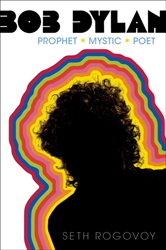Join a community of readers who are committed to Jewish stories
Sign up for JBC’s Nu Reads, a curated selection of Jewish books delivered straight to your door!
Seth Rogovoy, author of Bob Dylan: Prophet, Mystic, Poet, wrote about Bob Dylan’s Judaism, Jews who write Christmas music, and the album itself. He is guest-blogging all week for MyJewishLearning and the Jewish Book Council.
 When I first heard the songs on Bob Dylan’s Christmas in the Heart, I thought, not only is this the worst recording Bob Dylan has ever made, but it is literally unlistenable.
When I first heard the songs on Bob Dylan’s Christmas in the Heart, I thought, not only is this the worst recording Bob Dylan has ever made, but it is literally unlistenable.
Bob Dylan’s worst, after all, is typically a lot better than many people’s best, and as good as even more people’s mediocre efforts. But in its lack of inspiration and imagination, and in the poor quality of the performances, especially in Dylan’s horrible vocals, this seemed nothing more than a tossed-off, misguided effort, ranking even below such Dylan misfires as Self Portrait, Knocked Out Loaded
, and Down In The Groove
. (What’s that, you say? You never heard of those? Well, there’s a reason.)
Which still leaves the unanswerable question, why? Or, more precisely, what does it mean?
I think, short of getting inside of Bob Dylan’s head — which, having studied him long and hard for more decades than I care to admit, is a place I’ve concluded you don’t want to go — we’ve established as well as we can why Dylan would want to make a Christmas album. It makes perfect sense in the greater context of Dylan’s career as an American musician, and even as a Jewish-American musician (see parts 1 – 3 of this series).
As for what it might mean, with the implication being what it might mean regarding Dylan’s self-identification as a Jew or a Christian, that’s a much more difficult question to answer. Indeed, it’s impossible to say.
It’s not my place to comment on the meaning of Christmas in contemporary America, although I’ve had plenty of chances to observe it up close and personal being celebrated by a wide cross-section of people from all walks of life. And I’ve often had it explained to me by those who do honor the holiday in one way or another that it has little to no religious significance (this is often by way of their inviting me to join in the festivities).
As with all of Bob Dylan’s songs, ultimately whatever “meaning” there is in a song is something personal that exists between the singer and the listener. It’s not for any writer or critic to decide a song’s ultimate meaning (I say this as one whose book about the profound Jewish meanings of much of Dylan’s work is on the eve of publication). I don’t even think it’s up to Bob Dylan to decide his songs’ ultimate meanings; if he offered up any interpretations, they’d be suspect, in any case.
As for me, I’ve warmed to Christmas in the Heart. Some of the performances are insinuating (I’m having a hard time getting his “Do You Hear What I Hear?” out of my head, for better or worse, and much to the annoyance of close friends and Twitter followers). There’s a certain amount of kitsch value to the recordings (although not nearly as much personality and humor as was found on last spring’s Together Through Life). There’s nothing really here to offend anyone of any persuasion, other than some of Dylan’s less attractive barks and growls, and some of the choir’s more offensive dollops of sugar.
Great Dylan it’s not; a great Christmas album it’s not. Another small chapter in the inscrutable career of Bob Dylan it is. And for that alone, it’s worth a listen.
Seth Rogovoy is the author of Bob Dylan: Prophet, Mystic, Poet, due from Scribner on Nov. 24, 2009. Please visit Rogovoy’s official website.
Bob Dylan’s Christmas Album (Part 1)
Bob Dylan’s Christmas Album: The Jewish Contribution to the ‘Holiday’ Genre (Part 2)
The Meaning of Bob Dylan’s Christmas Album: The Music (Part 3)
Bob Dylan’s Christmas Album: What Good Is It? (Part 4)